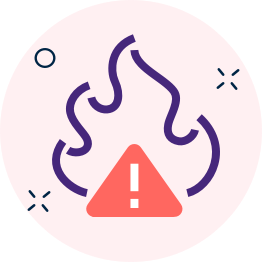UC signs.
UC symptoms.

When you have ulcerative colitis (UC), symptoms are an important sign of what’s going on. Even when undergoing treatment that has some positive effect, some symptoms can still persist. That can mean it’s time to talk to a gastroenterologist.

On this page, you’ll find info about:
Symptoms 101
Symptoms can vary from person to person, and they can range from mild to severe, affecting different parts of the colon.

Here are some of the most common symptoms for UC:
- Abdominal pain/discomfort
- Blood in stool
- Urgent need to use the restroom
- Tenesmus (a sense of pressure in the bowels)
But you could also experience other symptoms such as:
- Fever
- Weight loss
- Frequent, recurring diarrhea
- Fatigue
- Reduced appetite
If you’re experiencing any of these symptoms, visit your gastroenterologist for an evaluation.

When flare-ups erupt
With the right treatment plan it’s possible to go through a period of time with few or no symptoms. That period of time is known as remission. However, if your symptoms come back or worsen, that’s called a flare-up. In addition to ulcerative colitis treatments, there are things that can help manage flare-ups. Equally important, there are things that could worsen the symptoms of a flare-up or trigger one.
Things that can worsen a flare-up
- Not taking the prescribed dose of medication—If you’re taking your medication as prescribed and still experience flare-ups, talk to your doctor about possibly changing the dose, frequency, or medication.
- Nonsteroidal anti-inflammatory drugs (NSAIDs)—Aspirin, naproxen, and ibuprofen are medications that could worsen returning symptoms and lead to inflammation.
- Antibiotics—Used for treating bacterial infections, antibiotics also change the bacteria in the intestine. These changes to the bacteria may cause diarrhea or inflammation. Tell your doctor if you’re taking antibiotics and experience an ulcerative colitis flare-up.
- Smoking—Smoking not only raises the risk of developing ulcerative colitis, but it can also trigger flare-ups.
- Stress—While emotional or physical stress doesn’t cause ulcerative colitis, it can affect or intensify symptoms.
- Foods that irritate your colon—There’s no evidence that food can cause or cure ulcerative colitis. Nor is there any evidence that it can cause a flare-up. But during a flare-up, food can affect your symptoms. Every person with ulcerative colitis is different when it comes to foods or drinks that may aggravate symptoms.
It's important to tell your gastroenterologist if you’re experiencing a worsening of ulcerative colitis symptoms, so they can help you determine if your treatment plan needs to be adjusted.
It's important to track symptoms
Gastroenterologists can treat ulcerative colitis more effectively when they know the frequency and intensity of your symptoms.
When you’re experiencing symptoms, track your responses to the following questions and bring along to your gastroenterologist:
- What symptoms do you experience during a flare-up?
- How often do you experience each symptom?
- Do you experience loss of appetite? What are problematic foods and/or drinks?
- How do your symptoms affect your daily life? How often?
- Are there other complications such as joint pain, skin issues, and liver issues? How often?
If your symptoms change or if you’re experiencing a flare-up, make an appointment to speak to your doctor.
Recommended topics for you
Did you know UC
can be a progressive
disease?
This means that symptoms can get worse over time.
Healthy practices to
help manage UC
Complement your current UC treatment plan with healthy lifestyle practices.
